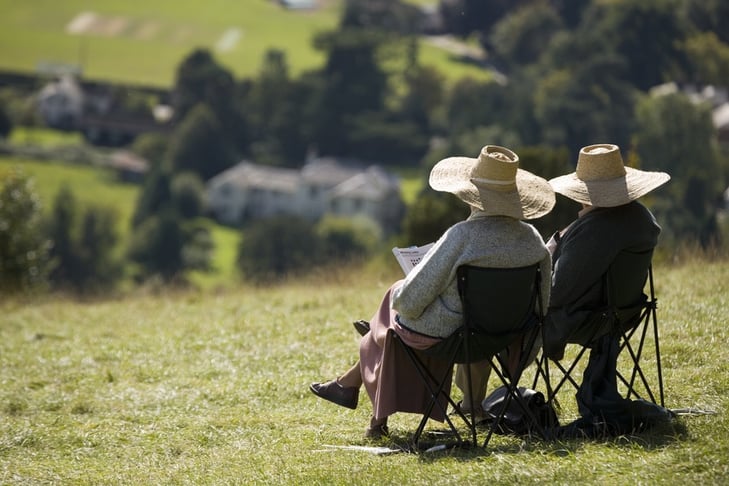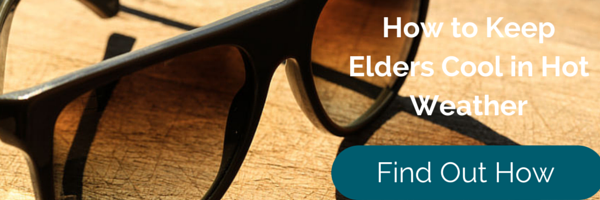Seniors living in Cincinnati know: our summer climate is more often than not closer to Deep South than it is to Midwest. Between June and early September, the air tends to be still, humid and hot. It’s what your grandmother, seeking a polite way to say it, might have called “close.”
That means that air conditioning is a must for summer comfort. Without it, it can be difficult to sleep at night. You can feel sluggish during the day. And you could put yourself at risk of heat exhaustion or heat stroke.
But running the air conditioner all day, every day, can become quite expensive — particularly if you have a low tolerance for heat and keep it below 72 degrees or so. Here are a few ways that seniors living in Cincinnati can keep their retirement community apartments cool while remaining within their utility budgets.
1. Shade your east and west-facing windows
As we all know, the sun rises in the east and sets in the west. And direct sunlight will heat a room quickly. So, to keep your apartment cooler, try blocking some of that sunlight.
Your best option for doing so is to hang blackout curtains, which block the majority of sunlight. In the morning, draw the blackout curtains along the east wall to block the direct sunlight and open those on the west wall, to allow indirect natural light in. At noon, reverse this configuration.
You could also buy portable thermal shields — you’ll see these placed in the windshields of some parked cars during the summer. Thermal shields have foil-lined exterior faces, which reflect the majority of visible light and infrared red (heat) wavelengths back out into the environment and keep the air in your apartment from warming up. Employ them the same way that you would blackout curtains.
Remember, too, that at this latitude, the sun’s daytime arc always traces through the southern half of the sky, so the windows on the south side of a building will always receive more light than those on the north (this is the same reason why shade-loving mosses grow on the north sides of trees in the Northern Hemisphere).
To that end, consider hanging heavier blinds or a draw shade along your south-facing windows, so that you can block some of the afternoon sun.
2. Buy houseplants
Houseplants aren’t just decorative; they’re useful. Houseplants scrub toxins and carbon dioxide from your apartment’s air, and replace it with fresh, breathable oxygen.
But they also remove a certain amount of heat and humidity from the air! Remember: Plants grow by photosynthesizing sunlight and taking up water, and using these to power their cells’ activities. When sunlight hits the leaves of green plants, it is mostly absorbed — especially the light wavelengths toward the red and infrared (hotter) side of the spectrum. So plants quite literally absorb heat.
They also draw ambient water vapor (humidity) out of the air. Remember why air conditioners work? They also cool things off by drawing humidity out of the air.
YOUR FUN, NITTY-GRITTY SCIENCE MINUTE FOR TODAY:
(If you’ve ever studied chemistry or physics, then you know that removing energetic water vapor molecules from an atmosphere removes a certain amount of heat energy, too — a process called entropy.
Placing photosynthetic plants in your apartment increases your apartment’s thermodynamic entropy rate — they make your apartment cool off faster than an apartment that has no plants. That means the air conditioner in a senior apartment with lots of green house plants will have to work less to cool the air, reducing your energy bill!)
3. Run appliances only at night
What happens when you run a dishwasher, washer, dryer or other electric appliance? The motor heats up, right? Well much of that heat is then transferred to the ambient air in your apartment. In other words, running appliances heats up your apartment.
In the daytime, when the air is already warmed by the sunlight, running appliances adds to the misery and causes your air conditioner to draw more power to cool things back down. But, if you wait to run your dishwasher, etc., until after dark, when the air is cooler, your air conditioner won’t labor as much.
4. Don’t work your AC too hard
There’s a long-term consideration, too: air conditioner coils can freeze up if they’re working too hard.
It’s a common paradox that HVAC professionals encounter. The air gets hotter, so a senior turns his or her thermostat down to compensate, which makes the air conditioner draw more humidity out of the air, which creates more condensation along the air conditioner coil, and the condensation freezes into an ice ball that stops the air conditioner.
Thus, it’s never a good idea to set your thermostat below about 68 degrees or so; any lower and you run the risk of overworking your AC. Not to mention, the more it runs, the higher your bill will be.
Instead of continuing to turn down the thermostat, use the tips above to help your air conditioner do its job with less work. Keep your senior apartment cool this summer!













